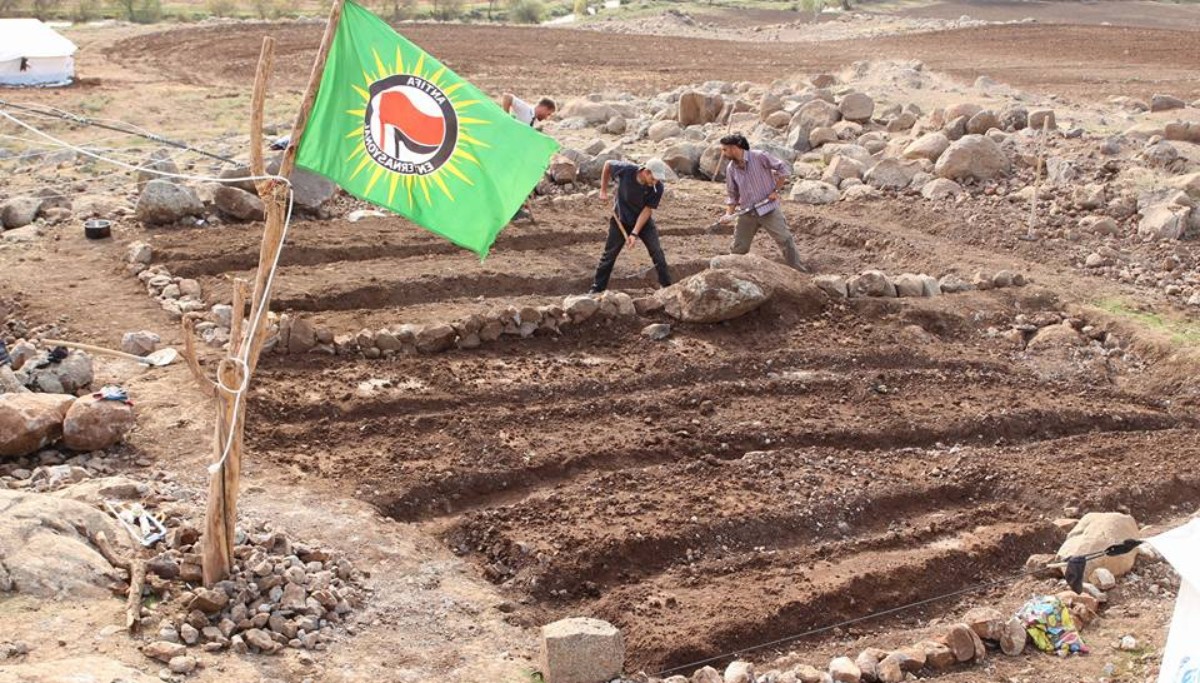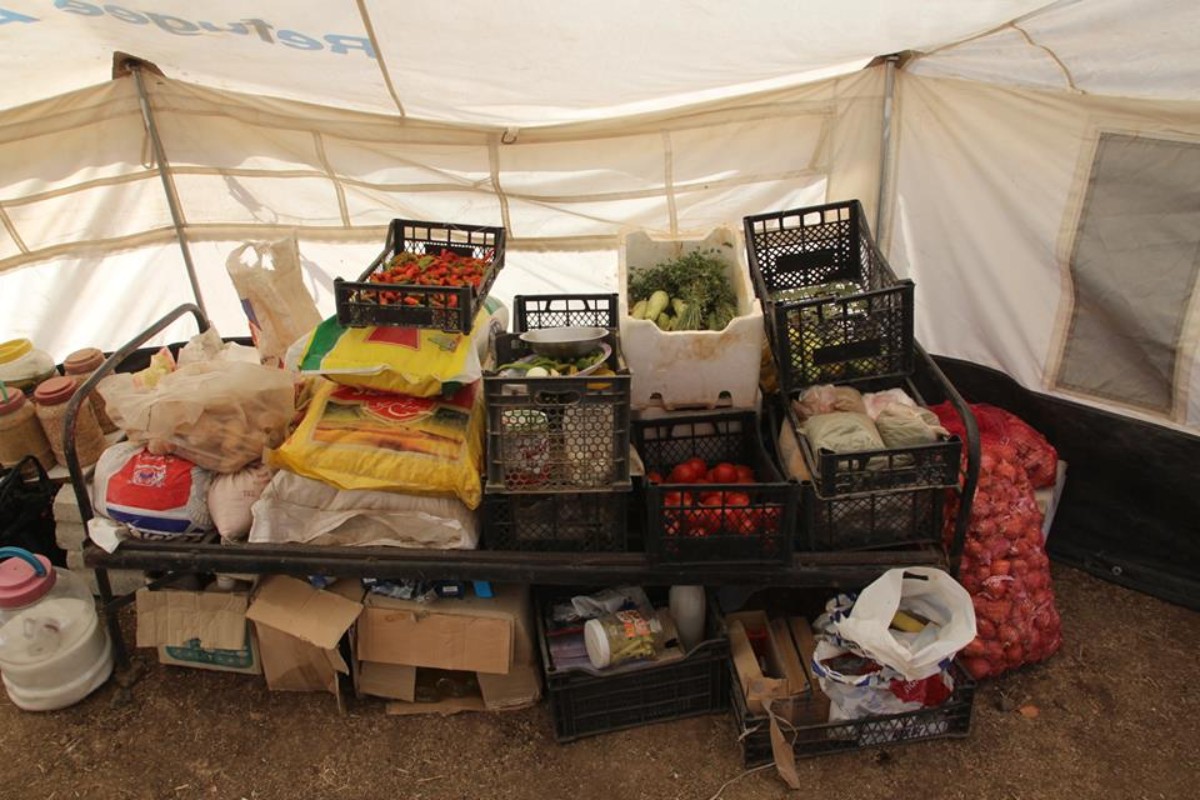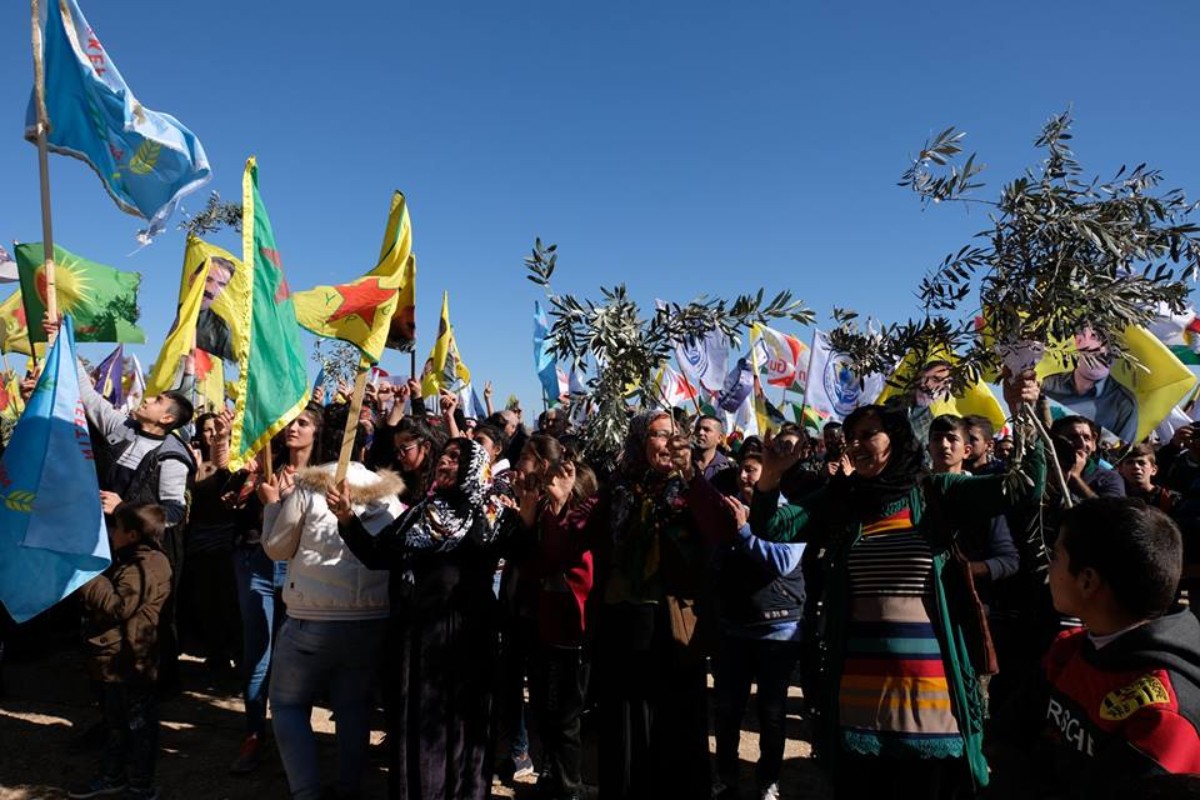Filed under: Featured, Resistance is Life

8 years on, and the revolution in Rojava continues. Wanting to know more about one of the most important autonomous movements in the last several decades, we are now working with the folks at Internationalist Commune to present this ongoing column about life within the Rojavan Revolution.
The revolution in Rojava is going on it’s eighth year now. The work here is far from over. It’s been a difficult place to access if you’re an internationalist who doesn’t want to join YPG or YPJ, and wants to see the social revolution in action. The Internationalist Commune is a landing place for many people freshly arriving in Rojava from other countries. This article will be an introduction to the commune, and columns in the future will include experiences of commune members as they work in different structures in society.
Here in Rojava, we’re building a new internationalism
A few weeks ago, comrades from the Palestinian People’s Party read a message of support from the Internationalist Commune of Rojava to a youth festival in the West Bank, and raised the flags of Palestine, Cuba and Rojava’s all-female militia YPJ over their door.
Internationalists in Rojava are typically compared to the International Brigades of the Spanish Civil War. But the history of internationalist struggle and unity goes far beyond the European continent. In their time, both Cuba and Palestine have embodied this cause as well.
 The 1966 Tricontinental Conference in Havana brought together 500 leftist delegates from 82 nations. On liberated land, Fidel Castro, Salvador Allende and Moroccan socialist Mehdi Ben Barka stood shoulder to shoulder with guerrillas and liberation movements from across the three most heavily-colonized continents.
The 1966 Tricontinental Conference in Havana brought together 500 leftist delegates from 82 nations. On liberated land, Fidel Castro, Salvador Allende and Moroccan socialist Mehdi Ben Barka stood shoulder to shoulder with guerrillas and liberation movements from across the three most heavily-colonized continents.
Likewise, Palestinian Liberation Organization training camps in the 1970s and 80s provided space for militant revolutionaries from all over the world to learn and struggle together, from Germany’s Red Army Faction to the nascent Kurdish liberation movement. Especially in countries engaged in anti-colonial struggle, liberated and autonomous land has long given space for mutual education and struggle. Here at the Internationalist Commune of Rojava, we see ourselves as inheritors of this tradition.
Internationalist Commune
Hundreds of people have traveled to Rojava to join the democratic, women-led revolution here since 2011, when the Syrian Civil War created the power vacuum necessary for the Kurdish people to throw off the repression of the Assad regime and establish autonomous self-rule.
Some civilian internationalists found a place among the new civil institutions like the communes, the YCR youth union or the autonomous women’s structures; other international projects foundered due to a lack of connection with the local people and institutions.
https://youtu.be/DIuXtS1C6BE
In general, the internationalists were different people, from different countries, doing different things: the situation was what our Kurdish friends would call tevlihev, all mixed up without order.
Moreover, as Palestinian internationalist Baz Soz remarked in an interview last year, “considering the importance of the revolution in Rojava we are still few in number. Especially if we compare the situation to Spain in 1936, we see that the scale of our work is far too small.”
“Over the last nine months then comrades have been laboring to transform a rubble-strewn butte rising up from among the endless wheat fields of Jazira Canton into the Martyr Helin Qerecox Internationalist Academy.”
Our commune, officially inaugurated a little over a year ago in summer 2017, was an attempt to give structure and organization to this work. We wanted to remake the internationalist face of this revolution and facilitate the participation of other internationalists. The commune was created by internationalists who had been working for a long time in Rojava, together with the Youth Union of Rojava (YCR).
It is a political structure, uniting internationalists working in places as far apart as the Yazidi people’s mountain homeland of Shengal and the autonomous women’s village of Jinwar – and some who have since returned to Europe to continue their revolutionary work in their home countries.
But we also saw the need to build ourselves a physical home, and establish a permanent and meaningful relationship to the people and land around us. Over the last nine months then comrades have been laboring to transform a rubble-strewn butte rising up from among the endless wheat fields of Jazira Canton into the Martyr Helin Qerecox Internationalist Academy.
Learn
We are always struggling to get away from the perspective that we can simply transfer the democratic-confederalist system into the West – or that we can directly transplant our own Western ideas here. We approach the Rojava revolution humbly and with respect, and understand it’s not something which was made for us, for our university campuses, or for our squats.
It’s something which was made in a society which has been a revolutionary society for a very long time, which was built out of the Kurdish liberation movement, which was built in the context of the Middle East.
Naming our academy after the British martyr who lost her life fighting the fascist Turkish state in Afrin is just one example of how we keep our minds focused on the sacrifices which enable us to sit here before our laptop today, on liberated land.
The walls are decorated with images of fallen revolutionaries, from Black Panther Fred Hampton to the members of the YPG media team killed by Turkish bombs last year in the Qerecox mountains: in our daily Kurmanci class, we translate and sing old songs of the Kurdish resistance.
 In general, we organize our daily life around three principles: learn, support, organize. Using methods of criticism and self-criticism (tekmil), we develop our revolutionary perspective and approach to life – Abdullah Ocalan writes that the greatest part of a revolutionary’s struggle is against their own self and personality, and daily life is structured with this in mind.
In general, we organize our daily life around three principles: learn, support, organize. Using methods of criticism and self-criticism (tekmil), we develop our revolutionary perspective and approach to life – Abdullah Ocalan writes that the greatest part of a revolutionary’s struggle is against their own self and personality, and daily life is structured with this in mind.
We have formal, structured education periods, where we share knowledge and analyses in a two-way process. It is humbling to see revolutionaries with 40 years’ experience humbly pondering criticism from a newly-arrived 19-year-old member of the commune.
More generally, we see our physical work in the camp as an opportunity to put the ideas we discuss in seminars or the criticisms we receive in tekmil into practice. By filling the day with common work, discussion and struggle, we try to break down our liberal and individualistic approach to life and build up shared bonds of hevalti (comradeship).
Support
We are not here to impose Western ideals on the revolution, but nor are we tourists here to have exciting experiences while giving nothing back. From the health structures to media projects, from our Make Rojava Green Again campaign to the autonomous women’s structures, most members of the commune move on to work in the local society for months or years at a time.
https://www.youtube.com/watch?v=dZqjISYurLA
Work in society is a chance to struggle together with the Kurdish movement to build up connections which can reach back to our home countries (as with the media work), and also to develop an internationalist response to the international forces which are striving to destroy the Rojava revolution. For example, we can offer a rare insight into life in the West to the local youth, many of whom might be pondering flight to Europe along the bloody refugee trail.
“Here, in the context of a revolutionary society, the word’s meaning is precisely opposite. There are 4,000 communes all over Rojava, covering the majority of villages and streets.”
It’s an opportunity to share not merely a Western leftist, but a specifically internationalist perspective. The young people want to know why we came here, what we saw in Rojava that we couldn’t find in our home countries, why people from Germany or England or Catalonia want to risk their lives to defend this revolution.
Through these conversations, we move together towards the understanding that life in the West is not the Elysian free-for-all it is depicted as on TV, and share our belief that what Murray Bookchin calls the “last great chance” for society can be found here in the heart of the Syrian crisis.
“My internationalist perspective was something important that I could pass on to the youth,” says internationalist Cemile of her time spent organizing in the youth movements. “The importance of the progress here for revolutionary processes everywhere, their function as a role model for others, the connection between different fights which I consider necessary for a worldwide revolutionary change.”
Organize
To Western ears, the word “commune” conjures up images of like-minded people agreeing with one another in cuddly circles, of hippies and Anabaptists and theosophical gurus squirreled away in the woods, of delusions of autonomy and horizontal organizing when in fact the same old hierarchies and repressive power structures replicate themselves within the ‘liberated’ space – of a failed politics of retreat, in short.
Here, in the context of a revolutionary society, the word’s meaning is precisely opposite. There are 4,000 communes all over Rojava, covering the majority of villages and streets. Ordinary people decide on most political matters through this commune system – having their say on major issues, but also resolving disputes about car parking spaces and organizing their own neighborhood security.
Women take the leading role, organizing autonomously in all parts of the self-administration and occupying a guaranteed 50 per cent of leadership roles. The commune works in tandem with autonomous women’s houses, with the aim of resolving the oppression and discrimination women face in daily life.
It’s the building block of Abdullah Ocalan’s vision of a future society, “a democratic nation instead of the nationalist-statist nation based on strict borders.”
 The difference between this radically democratic restructuring of society and communes as we know them in the West is diametric. In the West we recognize that we can’t change the world outside, so live how we want within our four walls: in the democratic confederation of communes, we change the way we live our daily life so that we can change the society we’re a part of.
The difference between this radically democratic restructuring of society and communes as we know them in the West is diametric. In the West we recognize that we can’t change the world outside, so live how we want within our four walls: in the democratic confederation of communes, we change the way we live our daily life so that we can change the society we’re a part of.
In this light, internationalism must be understood not as a mere act of charity, or even of solidarity. It is a dynamic, a way of thinking. Like the commune, it is a form of political thought which willfully transgresses borders, creating alternative networks of human relation such that the nation-state withers away to be replaced by the truly democratic nation.
The reality from which the Kurdish liberation struggle emerged is that Kurdistan was and is divided into four parts, kept under the dominion of four (now three) viciously repressive nation-states. The whine of Turkish drones over our peaceful commune reminds us that the forces of international capital, embodied in the nation-state, are putting up a bloody and tireless resistance to our attempts to overcome these forms.
“The whine of Turkish drones over our peaceful commune reminds us that the forces of international capital, embodied in the nation-state, are putting up a bloody and tireless resistance to our attempts to overcome these forms.”
Thanks in part to the geopolitical bifurcation of the Kurdish people, a transnational mentality has been part of the Kurdish liberation struggle from the outset – the first three members of the Kurdish liberation movement were one Kurd, one Turk and one member of the Laz minority group.
The Kurdish people have gone to great efforts to make their revolution an open one, to give both international fighters and civilian internationalists like us the opportunity to come here and learn, and develop the connections we need if we are to form a new internationalism with its roots here in the cradle of civilisation.
We do not have all the answers. What we do have, thanks to the remarkable openness of the Kurdish liberation movement, is the possibility to find them.





